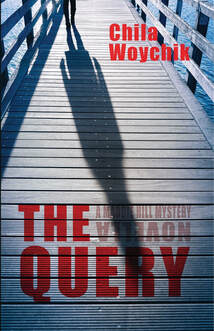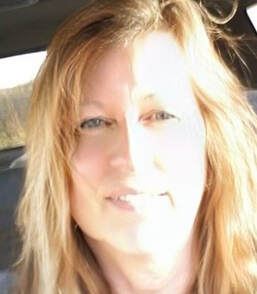CHILA WOYCHIK
Don't bend; don't water it down; don't try to make it logical; don't edit your own soul according to the fashion.
Rather, follow your most intense obsessions mercilessly.
Franz Kafka
Rather, follow your most intense obsessions mercilessly.
Franz Kafka

Singing the Land: A Rural Chronology from Shanti Arts Publishing, Maine (May 2020), a collection of previously published essays reformatted into a month-by-month look at rural living.
Walmart.com, Amazon
_______
"A ... meditation on the wonder of small moments, artfully told." Kirkus Reviews

The Query from Port Yonder Press (July 2020), #1 in the Maddie Hill Mysteries series of novellas.
________
A small press publisher. Pan Am Flight 103. A strange manuscript query. How does it all fit together? Maddie Hill is passionate about her book press, but when last day submissions happen, she's also relieved. That is, until she receives several confusing emails, phony names, and veiled threats. Not to mention, she misses Sasha, though she’d never admit it. And is her mentor really who he says he is? Everything eventually comes to light after several cat and mouse hours of who-did-what-and-why.
Available from Wellington Square Bookshop and Amazon.
|
|
Anne: “Don’t you ever imagine things differently from what they are?”
Marilla Cuthbert: “No.” Anne: “Oh Marilla, how much you miss.” (Anne of Green Gables) The dragons of Chad and the Little Folk of Underwood. Lewis and Eliot of Tallwood, and the pirates of Ravenswood. Breezes and squirrels, moons and gardens, and a ship lost at sea. I’ve not scrubbed these short stories and poems of male-specific gender references or topics that tend to lean toward the male gender. I have not removed the reality of little boys playing Lego™ war games or “dragons” seeking revenge. (And I must add that most of these poems were written for my son, a boy, though I hope girls can enjoy them too.) I’ve stayed true to the time period in which I wrote them, and to my son’s age when I wrote them, as well as to where I was in my own personal and philosophical journey. I realize that today’s children are dealing with more issues than ever before, more controversy, but they’re still children, and they need to be children, at least for a little while, before the big bad world closes in around them. There’s at least one nonsensical poem (“A Comma Free Verse Poem”), and the rest are, hopefully, just plain fun, encouraging children to wander blithely through their young life with a fertile imagination and picturesque heroes and, at times, anti-heroes who display the same less than noble characteristics we all give in to occasionally, if we’re honest. We want them to realize there is often great malevolence in this world as well as profound goodness. But even within the tales of a human-slaying dragon and an evil ship’s captain come the subtle teaching opportunities that we as parents can use to help build beautiful and positive traits in our children, traits that bring them to a place of honorable adulthood, to contributing members of an often-flawed society. I’ve left capitalization of the first word in each line for some of the younger children’s poems, and taken it off the others. I think capitalizing each first word for the youngest may help with reading comprehension or memorization, but that’s just my theory. The last half of the book, for the older readers, consists of a novella called “Adventures in Tallwood.” It’s a multi-character bildungsroman, a coming-of-age piece in several parts (with a distinctively Narnian-feel, spiritually-wise). In all, I hope these offerings will be enjoyed. I especially hope that all children everywhere get a winning chance at being carefree, cared for, and protected in their formative years. ~Chila Woychik August, 2024 |


